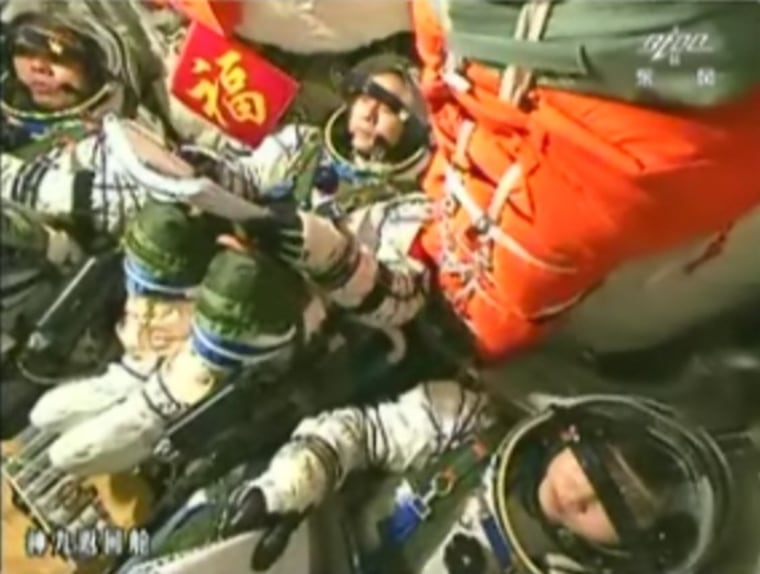China launched its most ambitious space mission yet on Saturday, carrying its first female astronaut and two male colleagues in an attempt to dock with an orbiting module and work on board for more than a week.
The Shenzhou 9 capsule lifted off as scheduled at 6:37 p.m. (6:37 a.m. ET) from the Jiuquan Satellite Launch Center on the edge of the Gobi Desert. All systems functioned normally and, just over 10 minutes later, it opened its solar panels and entered orbit.
The launch was declared a success by space program chief Chang Wanquan, a People's Liberation Army general who sits on the ruling Communist Party's powerful central military commission — underscoring the program's close military ties.
Female astronaut Liu Yang, 33, and two male crew members — mission commander and veteran astronaut Jing Haipeng, 45, and newcomer Liu Wang, 43 — are to dock the spacecraft with a prototype space lab launched last year in a key step toward building a permanent space station. All three are experienced pilots and officers in the Chinese air force.
Also in attendance for Liu’s big moment: Liu Yandong, the only woman in China’s ruling Politburo.
The launch, which was broadcast on Chinese state central television, was a popular topic on China’s twitter-like service, Weibo. There were over 372,000 posts on the microblog service with the hash tag, “Shenzhou 9 is launching today.”
"My whole family sat in front of TV and watched the whole launch. I almost had a heart attack. It's successfully launched! We're so excited and happy!" wrote one happy poster.
“I happened to watch the launch, everyone just held breath when they did countdown,” wrote another poster. “To be honest, many things have made me less confident lately, but at this moment nothing can stop this exciting patriotism."
In recent days, Chinese state media has been inundated with stories about Liu, who has 1,680 hours of flight time. One of Liu noted that this mission would not be the first time she’d flown under pressure, recounting a story about an emergency landing she once made after her plane struck 18 pigeons and one of her engines failed.
After undergoing two years of intensive training, Liu and a second woman, Wang Yaping, were selected as candidates for space missions.
Just how intense was the training? A post on “Weibo News” microblog said that during Liu Yang’s two years of training, she allegedly never saw a movie, went out shopping or even walked out of the Beijing-located government compound she was stationed in.
It is believed that since Liu was selected for this flight, Wang – also a former People’s Liberation Army pilot who notably flew rescue missions during the 2008 Sichuan earthquake – will likely be selected to crew another mission slated for 2013.
At a press conference Friday, Liu excitedly talked about the upcoming mission saying, “I want to experience the fantastic environment in space and appreciate the beautiful Earth and our homeland from space.”
Liu also discussed the intense training the three person crew has reportedly undergone. “We have conducted more than 1,500 trainings on manual docking in the simulated devices, and have successfully grasped the techniques," said Liu.
"One glance, one facial expression, one movement ... we understand each other thoroughly," added Jing, who also noted that the team trained 16 hours a day for months preparing for this mission.
Two of the astronauts will live and work inside the module to test its life-support systems while the third will remain in the capsule to deal with any unexpected emergencies.
China is hoping to join the United States and Russia as the only countries to send independently maintained space stations into orbit. It is already one of just three nations to have launched manned spacecraft on their own.
Another manned mission to the module is planned later this year, while possible future missions could include sending a man to the moon.
The space program is a source of enormous national pride for China, reflecting its rapid economic and technological progress and ambition to rank among the world's leading nations. The selection of the first female astronaut is giving the program an additional publicity boost.
On a state visit in Denmark, President Hu Jintao congratulated everyone connected with the mission. "I urge you to carry forward the spirit ... and make new contributions to advance the development of our country's manned space mission," Hu said in a statement read to technicians at Jiuquan.
The astronauts are expected to reach the module, called Tiangong 1, on Monday. Now orbiting at 343 kilometers (213 miles) above Earth, the module is only a prototype, and plans call for it to be replaced by a larger permanent space station due for completion around 2020. That station is to weigh about 60 tons, slightly smaller than NASA's Skylab of the 1970s and about one-sixth the size of the 16-nation International Space Station.

China has only limited cooperation in space with other nations. Its exclusion from the ISS, largely due to objections from the United States, was one of the key spurs for it to start pursuing an independent space program 20 years ago.
China first launched a man into space in 2003, followed by a two-man mission in 2005 and a three-man trip in 2008 that featured the country's first spacewalk.
In November 2011, the unmanned Shenzhou 8 successfully docked twice with Tiangong 1 by remote control.
Shenzhou 9 is to first dock with the module by remote control, then separate and dock again manually in order to fully test the reliability of the system. The astronauts are to conduct medical tests and various other experiments before returning to Earth after more than 10 days.